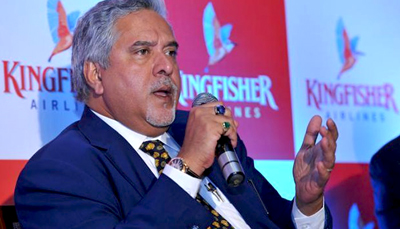News Delhi, Apr 7: A consortium of banks led by State Bank of India today rejected the proposal in the current form offered by liquor baron Vijay Mallya and his companies to pay Rs 4,000 crore by September towards settlement of his loan before the Supreme Court, which directed him to disclose his total assets by April 21.

A bench comprising Justices Kurian Joseph and R F Nariman asked Mallya and his companies to file their response by April 21 indicating how much amount they can deposit in the Supreme Court to prove their bona fides.
After a brief hearing of 20 minutes, the bench posted the matter for further hearing on April 26.
At the outset, the consortium of banks told the apex court that it is not averse to the settlement but Mallya has to show his bona fides by being present in the country.
"Vijay Mallya has to prove his bona fides by presenting himself for suitable negotiation and presenting a contingency plan that he is getting money from X and Y and then he will pay to the banks," senior advocate Shyam Divan, appearing for the consortium of banks, said.
"For suitable negotiations, he should be present and should declare all his movable, immovable, tangible and intangible assets in both in India and abroad," he said.
Divan said that the proposal given by Mallya in the present form has been rejected and it was conveyed to him after which he made a second offer last evening which is under consideration.
He said that for suitable negotiation Mallya needs to be in the country and before the court so that it is known what he plans to do and how.
Senior advocate C S Vaidyanathan, appearing for Mallya, said they have got the response from the consortium of banks after which they have replied to it last evening.
Vaidyanathan said he needs some time to seek further instructions on the decision taken by the consortium of banks.
The consortium of banks agreed to his submission after which the bench asked Mallya to file his response by April 21.
"Respondents (Mallya and his companies) should disclose all the properties -movable, immovable, tangible, intangible- and shareholding, both in India and abroad, to show his bona fides for the substantial negotiation," the bench said.
"Respondents (Mallya and companies) should indicate in their response how much money they are willing to deposit in the court to show their bona fides," it said.
The court also allowed Oriental Bank of Commerce to be impleaded as party in the matter.
Mallya, who is facing legal proceedings for alleged default of loans worth over Rs 9,000 crore from various banks, had on March 30 expressed willingness for a settlement by offering a proposal to pay back Rs 4,000 crore by September this year.
The proposal, which had been submitted in a sealed cover, covered an amount of Rs 6,903 crore and was placed jointly by Mallya and his companies - Kingfisher Airlines Ltd, United Breweries (Holdings) Ltd and Kingfisher Finvest (India) Ltd.
The banks had requested the bench that the proposal should be kept in a sealed cover till negotiations were going on for the settlement.
The liquor baron's counsel had told the apex court that the proposal had been prepared after discussions with Mallya, currently in United Kingdom, through video conferencing.
The bench had given time to the consortium of banks to look into the proposal and respond.





Comments
Add new comment